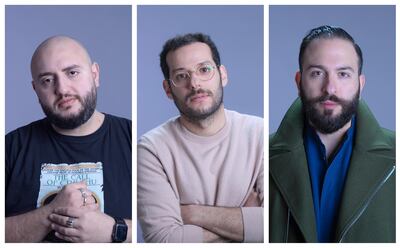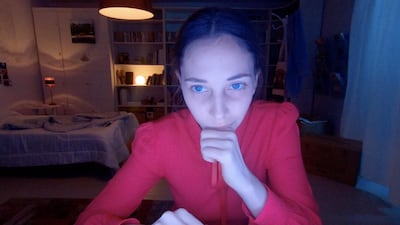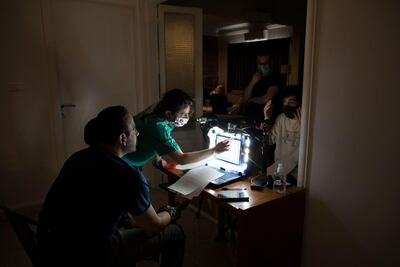It did not take Nasri Atallah, Firas Abou Fakher and Daniel Habib long to decide to start their own production company.
The three friends, who have a shared passion for film and television, were already collaborating on a number of projects and so teaming up happened almost organically.
Abou Fakher, one of the founders of Lebanese indie-pop band Mashrou’ Leila, is a composer and producer, while Habib is a writer and producer who teaches scriptwriting at the Lebanese Academy of Fine Arts in Beirut. Atallah is a published writer and producer, who also advises creatives on strategy.
When those skillsets are combined, they create a formidable team.
"Last summer, just out of conversations [while] hanging out, we figured we wanted to do something together around film and television," Atallah tells The National from his home in London.

"As we had that idea, people started asking us to pitch stuff before we even told anyone we were thinking about it, so that is kind of where all of this started."
Abou Fakher, who is in Jdeideh, Lebanon, said things started to snowball after that.
“We had to keep up and we were forced into it much quicker than we thought."
But it is something the friends are very happy about, as that is how their new company, Last Floor Productions, was created.
However, what none of them realised then was that their newly registered production company’s first show would be written, cast and entirely produced amid a pandemic.
Al Shak (The Doubt), a Shahid Original series, is a 10-episode psychological thriller that tells the story of a Saudi woman who has to deal with a past trauma while in isolation. It stars Saudi actress Fatima Al Banawi and Syrian actor Qusai Khouli, and the first episode was released on June 14.
While every show has its own process, Al Shak had a unique one, as the team had to consider the global crisis.
“Everything was happening through a computer screen," Abou Fakher explains. "It was incredibly strange, to be honest. We were Skyping when we were writing the script. We were on Zoom for hours a day, and then everybody would take their little part and work on it. We would talk to the team in Jeddah and talk to the director,” he says.
They worked in small crews between Beirut, London and Jeddah, where the show is set. The key, Habib says, was for everyone in the team to be flexible and have the ability to don different hats.
“The muscle and body of the show was us having to troubleshoot and be able to problem solve,” he says.
But, in a way, the show’s concept, being set during the pandemic, supported this and other aspects, such as the use of GoPro cameras and filming through a computer screen.
They also decided to change the story’s setting.
“There are limitations, there are restrictions, but we try to find creative ways of telling stories within those frames,” Abou Fakher says.
“We have the ability to tell the story in a lot of ways. What are the limits and what will get this show on air? This is a different model of thinking.”
This way of thinking has inspired them as they write the stories they want to tell moving forward. It is a model they say really works when you are part of a committed group. “You are in an industry where you are not making a small, intimate short film that is going to show at film festivals,” Atallah says.
“You are doing something that needs to work immediately and you are going to be ruthlessly judged if it does not, and it is going to affect your ability to work again, and your ability to hire 20, 30 people on every project.”
That encapsulates the state of today’s film and TV industry, which, globally, moves at an enormously fast pace.
Now, Last Floor Productions is working with its team of writers on two new shows and two feature films. And they are always pitching fresh ideas.
When asked about the kind of work they want to produce as a company, the three of them reply: "Good genre films and TV."
Abou Fakher explains: “When you watch a good genre film, whether it is a horror film or action film, or gangster film, at the core of those films are very human stories.
“Fiction genre is the foreground of our storytelling and then we start to fit in all the things that we are going through,” he says.
Habib adds: “We want to make content from the Arab world or about the Arab world that comes from this region one way or another, that we would be interested to watch."
For them, the dichotomy that exists in the Arab world between commercial and auteur filmmaking leaves a huge gap for creators, such as themselves, to step in.
“With the rise of streaming, and the rise of platforms like Shahid, there's a good middle ground, where you are able to tell stories that are based in reality and have a message and a core, [but] still cater to a large viewing audience,” Abou Fakher says.
That is exactly what the Last Floor Productions team is trying to achieve.
Ultimately, the three friends want their projects to not only be from and for the Arab world, but also appeal to an international audience.
“I am location agnostic," Atallah says. "I would love to film in Jordan. I would love to film in Sudan. I’d love to film in Europe and tell stories of Arabs in Europe or in North America or Latin America.
“We are so agnostic as to where we tell these stories, as long as they are compelling and genre-driven and are a new form of storytelling about Arabs – we don’t mind where they are happening.”



